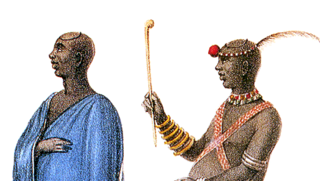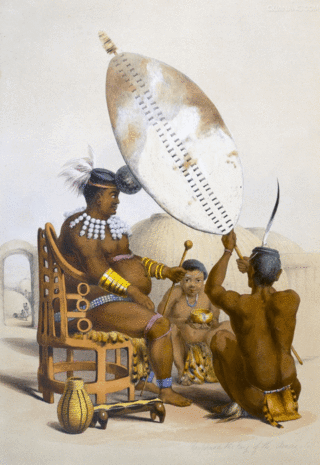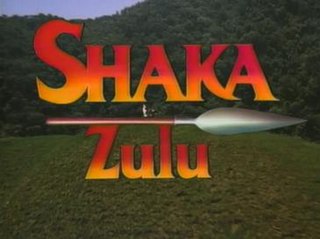Related Research Articles

Shaka kaSenzangakhona, also known as Shaka Zulu and Sigidi kaSenzangakhona, was the king of the Zulu Kingdom from 1816 to 1828. One of the most influential monarchs of the Zulu, he ordered wide-reaching reforms that re-organized the military into a formidable force.
Nandi KaBhebhe was a daughter of Bhebhe, a past Elangeni chief and the mother of Shaka kaSenzangakhona, King of the Zulus.

Dingane ka Senzangakhona Zulu, commonly referred to as Dingane or Dingaan, was a Zulu prince who became king of the Zulu Kingdom in 1828, after assassinating his half-brother Shaka Zulu. He set up his royal capital, uMgungundlovu, and one of numerous military encampments, or kraals, in the eMakhosini Valley just south of the White Umfolozi River, on the slope of Lion Hill (Singonyama).

Mpande kaSenzangakhona was monarch of the Zulu Kingdom from 1840 to 1872. He was a half-brother of Sigujana, Shaka and Dingane, who preceded him as Zulu kings. He came to power after he had overthrown Dingane in 1840.

Cetshwayo kaMpande was the king of the Zulu Kingdom from 1873 to 1879 and its Commander in Chief during the Anglo-Zulu War of 1879. His name has been transliterated as Cetawayo, Cetewayo, Cetywajo and Ketchwayo. Cetshwayo consistently opposed the war and sought fruitlessly to make peace with the British, and was defeated and exiled following the Zulu defeat in the war. He was later allowed to return to Zululand, where he died in 1884.
King Senzangakhona kaJama was the king of the Zulu Kingdom, and primarily notable as the father of three Zulu kings who ruled during the period when the Zulus achieved prominence, led by his oldest son King Shaka.
King Jama kaNdaba, the son of Ndaba kaMageba, was king of the Zulu Kingdom from 1763 to 1781. It is alleged he prophesied the birth of King Shaka. His grandfather was King Mageba kaGumede.

The Ndwandwe–Zulu War of 1817–1819 was a war fought between the expanding Zulu Kingdom and the Ndwandwe tribe in South Africa.
Mhlangana was a Zulu prince - the son of Senzangakhona, a brother of Shaka, and half-brother of Dingane and Mpande. He assisted Dingane and Shaka's induna (advisor) Mbopha in Shaka's assassination at Dukuza in 1828, and was himself assassinated by Dingane shortly afterwards.
Zwide kaLanga (1758–1825) was the king of the Ndwandwe (Nxumalo) nation from about 1805 to around 1820. He was the son of Langa KaXaba, a Nxumalo king.

Benedict Wallet Vilakazi was a South African novelist, linguist, a descendant of the Zulu royal family, and a radically innovative poet who created a combination of traditional and Romantic poetry in the Zulu language. Vilakazi was also a professor at the University of Witwatersrand, where he became the first Black South African to teach University classes to White South Africans. In 1946, Vilakazi also became the first Black South African to receive a PhD.

Shaka Zulu is a 1986 South African television series directed by William C. Faure and written by Joshua Sinclair for the South African Broadcasting Corporation (SABC), based on his 1985 novel of the same name.

The Zulu royal family, also known as the House of Zulu consists of the king of the Zulus, his consorts, and all of his legitimate descendants. The legitimate descendants of all previous kings are also sometimes considered to be members.

Sigananda kaZokufa was a Zulu aristocrat whose life spanned the reigns of four Zulu kings in southeastern Africa. According to oral history, Sigananda's grandfather was chief Mvakela, who married a sister of Nandi, King Shaka's mother, and that his father was Inkosi Zokufa. He also said he had a son called Ndabaningi.

The Zulu Kingdom, sometimes referred to as the Zulu Empire or the Kingdom of Zululand, was a monarchy in Southern Africa. During the 1810s, Shaka established a modern standing army that consolidated rival clans and built a large following which ruled a wide expanse of Southern Africa that extended along the coast of the Indian Ocean from the Tugela River in the south to the Pongola River in the north.

Emperor Shaka the Great is an epic poem based on the Zulu oral tradition, compiled in Zulu then translated by South African poet Mazisi Kunene. The poem follows the life of Shaka Zulu, documenting his exploits as a king of the Zulu people, who produced considerable advances in State structure and military technologies of the Zulu. Some critics express concern over the historicity of the retelling. However, Kunene's embrace of an African perspective on Shaka's rule expresses an attempt at understanding the apparent horrors observed by Europeans in the history of Shaka.

The Battle of Ndondakusuka was the culmination of a succession struggle in the Zulu Kingdom between Cetshwayo and Mbuyazi, the two eldest sons of the king Mpande, often known as the Second Zulu Civil War. Mbuyazi was defeated at the battle and was killed, leaving Cetshwayo in de facto control of the kingdom, though his father remained king. Mbuyazi's followers were massacred in the aftermath of the battle, including five other sons of King Mpande.
Princess Mkabayi kaJama was a Zulu princess, the head of the Qulusi military kraal, and a regent of the Zulu Kingdom. She persuaded her father, the Zulu King Jama kaNdaba, to remarry, and acted as a regent during the reign of her half-brother, Senzangakhona.
uHamu kaNzibe or Hamu kaNzibe was a Zulu chieftain, half-brother and great rival of king Cetshwayo.
References
- 1 2 Lipschutz, Mark R.; Rasmussen, R. Kent (1986). "Senzangakhona". Dictionary of African Historical Biography (2nd ed.). University of California Press. p. 213. ISBN 0-520-06611-1.
- ↑ Eldredge, Elizabeth A. (2014). The Creation of the Zulu Kingdom, 1815–1828. Cambridge University Press. pp. 74–75. ISBN 978-1-107-07532-0.